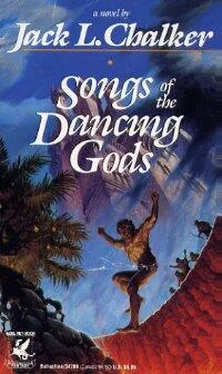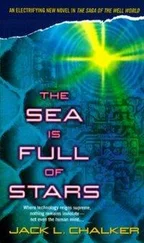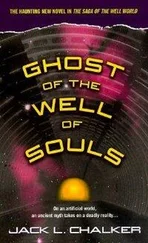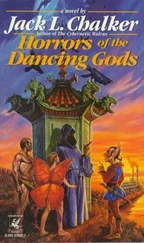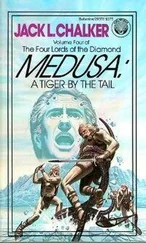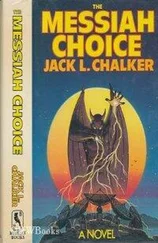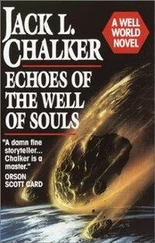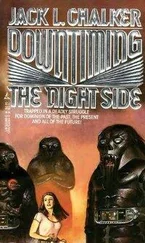Jack Chalker - Songs of the Dancing Gods
Здесь есть возможность читать онлайн «Jack Chalker - Songs of the Dancing Gods» весь текст электронной книги совершенно бесплатно (целиком полную версию без сокращений). В некоторых случаях можно слушать аудио, скачать через торрент в формате fb2 и присутствует краткое содержание. Год выпуска: 1990, ISBN: 1990, Издательство: Del Rey / Ballantine, Жанр: Фэнтези, на английском языке. Описание произведения, (предисловие) а так же отзывы посетителей доступны на портале библиотеки ЛибКат.
- Название:Songs of the Dancing Gods
- Автор:
- Издательство:Del Rey / Ballantine
- Жанр:
- Год:1990
- ISBN:0-345-34799-4
- Рейтинг книги:3 / 5. Голосов: 1
-
Избранное:Добавить в избранное
- Отзывы:
-
Ваша оценка:
- 60
- 1
- 2
- 3
- 4
- 5
Songs of the Dancing Gods: краткое содержание, описание и аннотация
Предлагаем к чтению аннотацию, описание, краткое содержание или предисловие (зависит от того, что написал сам автор книги «Songs of the Dancing Gods»). Если вы не нашли необходимую информацию о книге — напишите в комментариях, мы постараемся отыскать её.
Songs of the Dancing Gods — читать онлайн бесплатно полную книгу (весь текст) целиком
Ниже представлен текст книги, разбитый по страницам. Система сохранения места последней прочитанной страницы, позволяет с удобством читать онлайн бесплатно книгу «Songs of the Dancing Gods», без необходимости каждый раз заново искать на чём Вы остановились. Поставьте закладку, и сможете в любой момент перейти на страницу, на которой закончили чтение.
Интервал:
Закладка:
Jack L. Chalker
Songs of the Dancing Gods
For the Delphi Wednesday crowd:
Janet, Martha, Byron & Eileen, Cherp, Gardner & Sue, Pat, Chuq, Mike & Rosa, Paul, George, Brandon, Ralph, Eva (of course)
and, oh yeah, you, too, Resnick.
To those who came in late and to those away too long.
PREFACE
Just after the start of the past decade, I decided to write an Epic Fantasy Novel. It wasn’t anything that I came upon either late or cynically; back when I was a publisher, I published the first three books ever done about swords and sorcery and I’d read Conan when Conan, let alone Arnold Schwarzenegger, wasn’t cool.
I felt a little out of touch, though, in that genre; I still remembered the old stuff: Robert E. Howard, the still-going-strong Fritz Leiber, the ubiquitous Tolkien, and the like, but, aside from a couple of Moorcocks, my contemporary fantasy education was lacking.
Now, I know that reading the best science fiction of prior generations is an essential part of education, but if you read only thirty-year-old SF to get an idea of what was going on, you’d be pretty well out of it. With that thought, I went out and picked up a dozen or so major fantasies by various writers, who were now best-sellers and highly acclaimed and had their own groupies, and settled in to see what heroic fantasy had evolved into, fully expecting the same kind of revolution I knew had happened in science fiction. I won’t mention the titles or the authors, because it didn’t matter.
Before I was halfway through the first one, I had the eerie feeling that, although it had been written within the last couple of years, by someone far younger than I, somehow, I’d read it before. When a quick check to the end showed that it indeed went where I knew it would, I put it down and started anew.
The names were different, the points of view were shifted, the villain bore a different name, the hero was perhaps a bit nastier, but, this time, I knew I’d read it before—in the previous book.
Investigating this phenomenon further, I went through a ton of books, past and present, and came up with the remarkable discovery that there were really only two books there, and a hybrid constituting a third. One was an idealized quasi-medieval universe with its costumes and manners and My Lords and My Ladies and, somehow, the serfs who held it all together were mere background, unless, of course, the hero or heroine was raised as one not knowing that he or she was really Prince or Queen or something of the sort.
The other was Hyborea—whether Howard’s Hyborean Age or Smith’s Hyperborea, they were one and the same, focused perhaps on the barbarian adventurers as in Howard or on the upper class and top sorcerers and upper-class rulers as in Smith. Of course, the lower classes and thralls were mere background, unless, of course, the hero or heroine was raised as one without knowing that he or she was really Prince or Queen or… well, you get the idea.
This led to a research project to determine the truth of the matter. If indeed there really were only two epic fantasies, all the works being simple variations on common themes, or even, perhaps, just one, with the setting a choice between the time of King Lear or the time of Hamlet, then why? Was it that there were only two basic settings and a single set of heroic fantasy themes?
Rejecting straight away the cynic’s concept that all these books were knockoffs of the originals, both because I knew so many writers wouldn’t stay so bound otherwise, nor would such a wide audience continue to respond so enthusiastically to each slight theme and variation of the same book, over and over, I knew there had to be another reason, and, after much work, I discovered it, in an improbable place, while doing research in particle physics for another book.
There was not, as western religion tells us, a single creation, nor a series as other faiths have it. The single act of creation, the Big Bang, whatever you like, created not a single universe but many, overlapping but generally invisible and intangible and, therefore, unknown to one another. Ours is the Prime Universe, where the great and ultimate fate of all life would be decided in the epic battle of opposites, of good and evil, of powers of light and darkness.
In the backwash of this creation, the other worlds trail out, each occupying the same space but not the same space-time continuum. Because they were not fully formed, and the Ultimate Engineer was preoccupied with us, they were left for development to the Lesser Powers—let’s call them Angels. The universe closest to us is the universe of the Lesser Powers. Not quite as dynamic, shaped by Lesser Powers, it has developed differently.
At the start, both universes, theirs and ours, had as much magic as natural law, and creatures evolved that were like ours, even human, and partly human, and some intelligent races that were not human at all. On Earth, the humans became dominant to the point where they slew the others, out of fear, out of competition, or out of ignorance, driving the few remnants further and further underground even as physical law was locked into near immutability. Ultimately the others, the creatures of magic, of faerie, of centaurs and unicorns, pixies and leprechauns, passed into the realm of legends and stories, until there are none left here now who truly understand the magic or know its capabilities, and even fewer who truly believe. Without belief, the magic bends more to physics, so that even the powers of Darkness must battle through surrogates and hard technology in more hidden, mundane fashion.
In Husaquahr, which is the name of that other world, this did not happen. Natural law exists there, but it is of a more rudimentary and pliable nature than our own here and now. A master engineer designs a Great Pyramid, a Stonehenge, that lasts the ages; lesser engineers allow compromises and design flaws and their work eventually wears away or collapses. A Master Engineer designed our world; Husaquahr was designed by lesser lights. And from that came uneasy chaos which lasted for millennia.
An ironclad contract is one drawn up by a great lawyer; the contracts with all those loopholes are drawn by lesser legal talents. Ultimately, there arose a very few, a mere handful, of powerful magicians who were also master lawyers. Together they formed an uneasy but necessary alliance, the Council of Thirteen, and with their combined powers they began to fill in the loopholes in Husaquahr’s Creation, imposing logic, rules, on all the world, its denizens, its very stones, and codified these as the Books Of Rules for the guidance and training of future generations.
Order was imposed, but at the price of stagnancy. Things were as they were in broad terms because they were mandated to be that way by sorcerers so powerful, so much closer to Creation, that they were immutable.
Over the great span of time, though, even those great ones passed on, either through death or transmigration or in ways of which we can not even dream, leaving only the Rules to reign.
The Council, however, remained, filled by increasingly lesser individuals, lacking some of the power and all of the wisdom of the founders. Great sorcerers, yes, by comparison, but mere wisps of smoke compared to the ones who had once held their positions. Not, of course, that they thought so; generation after generation of Councils have worked hard to keep plugging more and more loopholes, adding on Rule after Rule, binding the whole of the world as tightly as roles in a never-ending stage Play-The inheritors from the greatest of the great and the wisest of the wise had evolved, if you want to call it that, into that most fearsome of the creatures of civilization.
Читать дальшеИнтервал:
Закладка:
Похожие книги на «Songs of the Dancing Gods»
Представляем Вашему вниманию похожие книги на «Songs of the Dancing Gods» списком для выбора. Мы отобрали схожую по названию и смыслу литературу в надежде предоставить читателям больше вариантов отыскать новые, интересные, ещё непрочитанные произведения.
Обсуждение, отзывы о книге «Songs of the Dancing Gods» и просто собственные мнения читателей. Оставьте ваши комментарии, напишите, что Вы думаете о произведении, его смысле или главных героях. Укажите что конкретно понравилось, а что нет, и почему Вы так считаете.
